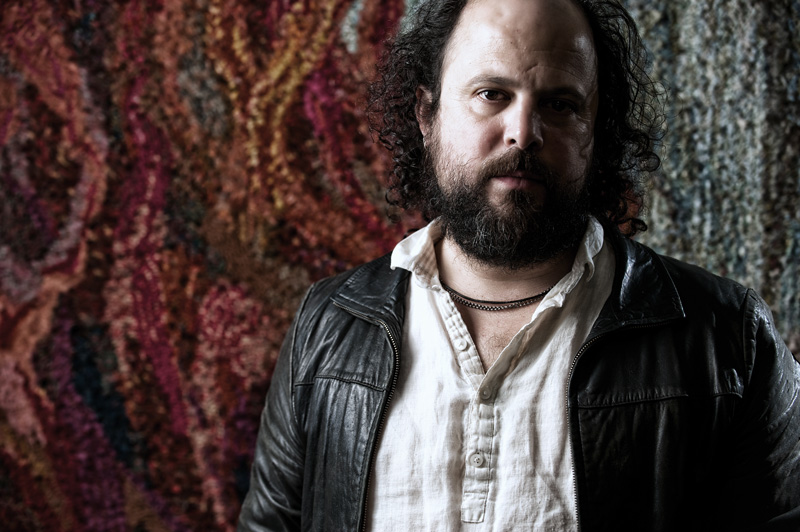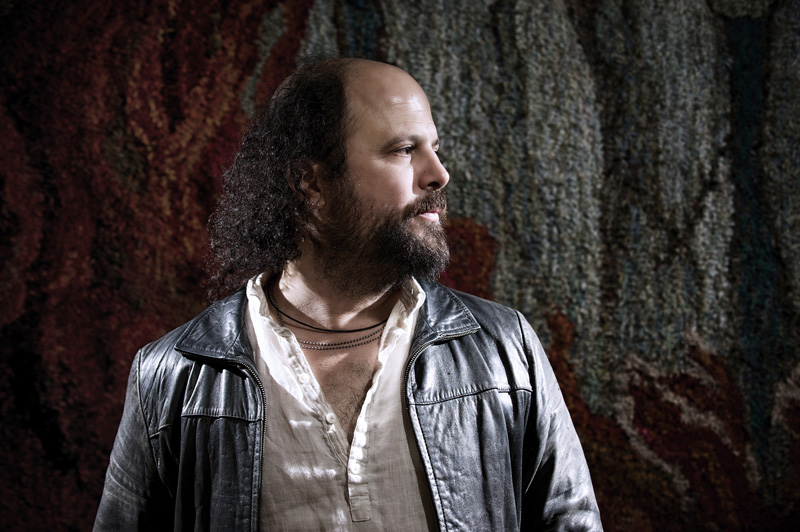By Darka Dusty
Photographs by Miri Stebivka
Jeremy Wilson is one of the good guys. In today’s climate of self-worship and laissez-faire “me-ism,” in which anyone needing a hand is now coldly referred to as lazy by certain segments of affluent society, Wilson, musician turned musician’s advocate, stands out among us as a superhero. Jeremy Wilson believes that people have the power to change the world. After surviving no less than four surgeries to fix a heart condition—surgeries made possible through the generous help of his friends and music community—Wilson now leads a life of philanthropy and devotion to that group. The experience of requiring major surgeries but having no health insurance was earth-shattering and transformed Wilson’s life in an unexpected way. His heart condition was the catalyst, and now his big heart drives his passion to give back to the music community every single day.
The Jeremy Wilson Foundation has saved a few houses from going into foreclosure due to medical bills, helped people through cancer, and aided one musician in getting the surgery he needed to restore his sight. Wilson is visibly moved when speaking about his work: “You can take a negative experience and let it ruin your life, or you can turn it into something good. It’s a choice.”
Born in Detroit to activist parents, Wilson lived on 8 Mile Road and vividly remembers the turbulent times of the late ‘60s and early ‘70s. Long bus journeys to Washington, DC with his mother took him to many civil rights rallies; he was even in proximity to Dr. Martin Luther King Jr. (albeit from his mother’s womb). Jeremy’s family moved, when he was still young, from Detroit to North Carolina to live off the land—Wilson and his family were surrounded by goats, chickens, rabbits, and the spiritual community of the Meher Baba Spiritual Center. He remembers this as a very happy time in his young life. From North Carolina, the family moved to Scotts Mills, Oregon, where Wilson’s father was promptly elected as mayor, simply due to the fact that he was the only man in town with a college degree. Wilson counts his father, whom he calls an “interesting cat,” as one of his heroes.
Meeting his other heroes has affected Wilson’s life in a major way and these experiences still feed his spirit to this day. Greg Sage, from Portland punk band the Wipers, attempted to get Wilson’s band, the Dharma Bums, their first record contract. Wilson shook Pete Seeger’s and Arlo Guthrie’s hands, and as a kid, hung out with Pete Townsend and listened to him play guitar while sitting at his feet. He even spent an entire night talking with Leonard Cohen about art and poetry, after which Wilson spent six weeks road-tripping and writing music for his Stranger’s Waltz record.
Wilson has always been a creative creature: As a child and young teen, he was a professional ballet dancer and was accepted into the Royal Academy of Dancing in London. He performed with the Oregon Festival Ballet. His dancing prowess became legendary, and at the age of 14 he experienced a Beatles-esque moment when screaming girls ran after him, shredding his clothes. After one such moment of fan frenzy, Wilson declared to his parents that he wanted out, but the patience and discipline of ballet is still with Wilson today: “What I loved about dance, and what I now love about yoga and live performance, is that my body’s muscle memory is still there—it’s the only thing I’m truly classically trained to do,” Wilson recalls.
One of the biggest influences on Wilson’s life was the aforementioned Meher Baba, an Indian spiritual master who many believed was an Avatar (god in human form). Wilson lives by Baba’s message, that we are all one: “You put your finger in the ground and you plant a seed.” The edict has permanently imbedded itself into Wilson’s DNA, who lives it, breathes it and is driven by it. A trip to India at the age of 18 solidified Wilson’s lifelong spiritual beliefs. Simultaneously, his creative fire was blazing: Within hours of his return to America, he was invited by two friends to move to Portland, where he’s lived for the better part of 27 years.
Portland means everything to Jeremy Wilson. He adores its quirky vibe, the inner-city farming, the brews…and of course, the music. He recalls Portland’s violent past and remembers how the music scene he helped to create raged against the bullying principles of Reaganomics and corporate heavy metal.
Wilson formed several bands which, by 1987, led to the Dharma Bums. Within a few years, the group was poised to become the big breakthrough band of the as-yet-unnamed grunge era; instead, Nirvana, who often opened for the Dharma Bums, exploded and would forever be associated as the definitive band of the genre. Wilson possesses no bitterness that the Dharma Bums were eclipsed by Nirvana and Pearl Jam. Instead, he speaks of his experience with love and gratitude: “Whenever I feel sorry for myself, I think about how wonderful it’s been to be around such talented people and such amazing music and art.” Others might have felt robbed, but Wilson knows that the experiences in his musical past were all stepping stones leading him toward a very different mission.
Wilson’s life changed dramatically when he discovered he had Wolff-Parkinson-White syndrome which would require several surgeries. He had been making music his whole life, and like many working musicians, Wilson had no health insurance. His passion for what happened next in his life was immediately apparent as he recalled what led to the inception of the Jeremy Wilson Foundation: “It’s amazing what came out after I got sick. At the time, I didn’t feel very good about myself at all. I didn’t think anyone gave a shit about me. Unbeknownst to me, people spread the word and the whole community literally came to my rescue. I was so touched and moved by that, it helped get me back in touch with the activist part of myself—not that I lost it—but it’s like the light came on. It’s a classic story. Artists and musicians don’t get paid in America, or anywhere, but they bring so much goodwill and beauty into the world, and they provide commerce for cities and businesses. Imagine a world without music! I wish we could live in a more compassionate world.”
When asked whether the seeds of activism his parents planted within him were a driving force in his decision to start the Jeremy Wilson Foundation, Wilson replied, “I was taught that you can change the world. I have so many jaded friends that say nothing’s new, or nothing can be done, and I just don’t follow that mindset. At the same time, I totally understand why they write songs like ‘Mama Don’t Let Your Babies Grow up to be Cowboys,’ because the choices I’ve made and the experiences I’ve had—I wouldn’t want to live any other way. It starts right here. It starts by opening up the door for somebody.” He smiles. “My gal Wendy tells me that my parents raised me right.”
The Foundation takes so much out of him that it’s sometimes hard to balance the work with his music. He credits the Portland community, many volunteers, and the hard work of his director of operations, Renée Muzquiz, as the reason things run as well as they do. “We’re working out the realities of what we can and can’t do. I think what I’m in awe of, are the people who organize to come together to help someone who doesn’t have any kind of safety net. Renée and I try to do everything we can to get the legal framework—it’s intense. When I started the foundation, I wasn’t even fully recovered from my own surgery, and then suddenly someone else needed serious help. So, I was like, of course! Let’s get this going!” To Wilson, it’s an honor being part of people’s lives, and part of their stories.
The twists and turns that led Jeremy Wilson to this moment have included more than enough for any one lifetime. But Wilson, at 45, is embarking on yet another ambitious odyssey. What started as a relationship breakup following his first heart surgery turned into a cross-country road trip, one that family and friends protested against vehemently. But off he went, spending days and nights on the road, writing the music that would become his new solo record, Empty through Empty Space. What started as a literal journey became a songwriting journey. Nights spent sleeping on the hood of his car in the desert looking up at the stars produced lyrics like this:
“A Softer Calling”
Time
To move into a new spring
And spin with the Earth
Start living the only days
We have left since this birth
Try and lay rest the hurt
It’s a softer calling
Transcendental wine
A slower motion
A softer calling
It ain’t chance
That you can fly around the world
See with the eyes of the street
Build something from a dream
Build it from the dirt
Lifted up from the hurt
It’s a softer calling
With these deeply personal words, Wilson summons the combined experience of his physical ailment and his emotional heartbreak, transforming a cruel twist of fate into an opportunity to be reborn, to repair, and rebuild. It’s a song that harkens the experience of letting the pain of loss live inside of you and become a part of who you are. He embraces this precious life as never before, as only a person who has faced death can do. He’s driven thousands of miles writing, crying, facing his mortality, facing the loss of love. He wrote Kerouac style, stream of consciousness; and sometimes music and lyrics just flowed out of him, complete and ready to record. He promised to be honest and not to judge himself. During the process of writing, he refused to let himself worry about being too clever or slick, both in lyrical content and in the production style.
Empty through Empty Space was recorded in the studio that Wilson built, which now includes office space for the Jeremy Wilson Foundation. He jokes that he originally built the studio with a soundproof live room “so that no one could really see or hear what a nut-ball I am.” The songs were recorded on Wilson’s vintage analog Otari 24-track machine—the individual tracks were not cut and pasted as digital recordings are done today. It’s a mostly live album, which isn’t easy unless one surrounds oneself with the kinds of musicians who are musically adept enough to take on such a challenge. Wilson did just that, assembling top Portland players (Dylan-Thomas Vance, Matthew Rotchford, Jenny Conlee-Drizos, Paul Brainard, and Matt Brown, among others) to help him flesh out his musical vision. Even Eric Lovre, Jim Talstra, and John Moen of the Dharma Bums make a sly appearance on the song “Can’t Bury You.”
Wilson says that what is good is worth waiting for—and the record’s been a long time in the making. Fans will get to experience it live on March 8 at the Doug Fir Lounge for Wilson’s record release show. Pete Krebs, who recently battled cancer and was a recipient of Jeremy Wilson Foundation’s charitable funds, will be the opening act. “Things don’t just come overnight. I like things to take a slower motion,” Wilson says, evoking the message from his song “A Softer Calling.”
Jeremy Wilson has a clean bill of health following his latest surgery. He is laser-focused on the Foundation, and hopes to see all of Portland on March 8 to celebrate his latest record.
Although he wants to take the record on tour, he is committed to his work with the Foundation. It will be a juggling act, as Wilson plans to travel with his new record to the South by Southwest music festival in Austin, Texas to do a few gigs. The road is always calling and Wilson seems to come up with reasons to follow it; whether the road is literal or metaphorical, Wilson, driven by heart and soul, is always moving. He moves through his experiences and comes out a better man each time. He moves us with his devotion to humanitarianism, to honesty, to his own humility. He moves us with his ability to come through his pain and peril with a newfound lust for life. And the subtleties of this life are not lost on him, as expressed in his song “The Whisper.”
The darkest sky I ever did see
Formed above the bluest ocean
So, I’ll have coffee and I’ll take tea
‘Cause all in all, everything’s just a part of me
The greatest gift I ever received
Came from the hardest bargain
Some draws the portraits and some draws the rain
It’s easy to get lost in the distance
The hardest line I ever did hear
Came barely as a whisper
Came barely as a whisper


